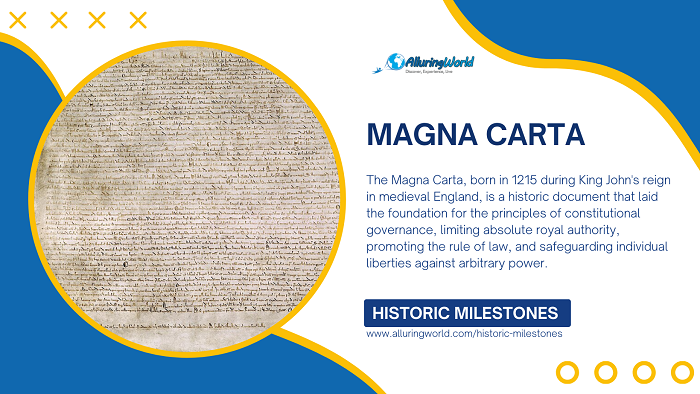Read time ca. 3 minutes
The Magna Carta, sealed in 1215, stands as a foundational document in the history of constitutional governance and individual liberties. Crafted in response to the oppressive rule of King John of England, this historic charter was a groundbreaking assertion of rights and limitations on monarchical power. The Magna Carta’s enduring significance lies in its role as a precursor to modern constitutionalism, influencing the development of legal and political systems worldwide.
The Genesis of the Magna Carta:
As mentioned above, the Magna Carta is a foundational document in the history of constitutionalism, emerging during a pivotal period in medieval England under the rule of King John. The oppressive financial practices and arbitrary taxations that were imposed by the monarch had instigated discontent among the barons, who found themselves increasingly burdened by the king’s unchecked authority. In 1215, a group of these disgruntled barons confronted King John, demanding redress for their grievances. Faced with the prospect of rebellion, the king reluctantly agreed to affix his seal to a written agreement, later known as the Magna Carta or “Great Charter.”
The Magna Carta, while initially a response to the specific abuses of King John, laid the groundwork for broader principles that would shape the evolution of constitutional governance. The document articulated the notion that even a monarch was bound by the law, introducing the concept of rule of law and limiting the arbitrary exercise of royal power. Additionally, the Magna Carta emphasized the protection of certain individual rights, establishing a precedent for the recognition and safeguarding of fundamental liberties, and over time, these principles would become integral to the development of constitutional frameworks, influencing subsequent generations and serving as a cornerstone for the evolution of democratic governance.
The Pillars of Liberty:
The Magna Carta, while born out of a medieval context, carried enduring principles that surpassed its immediate historical context. One of its crucial contributions was the establishment of the principle that justice should not be meted out arbitrarily, but rather administered through a fair and impartial legal process. This foundational concept marked a departure from the unchecked discretion wielded by the monarch, setting a precedent for the idea that the law should apply equally to all, including the king. By embedding this principle, the Magna Carta laid the groundwork for the development of a legal system based on the rule of law, a cornerstone of modern constitutional governance.
Furthermore, the Magna Carta introduced the revolutionary concept of Habeas Corpus, a legal safeguard ensuring that individuals could not be unlawfully detained without proper legal justification. This protection against arbitrary imprisonment became a fundamental human right, establishing a precedent that transcended the medieval context and laid the groundwork for the broader recognition of individual liberties. The Magna Carta’s articulation of these principles contributed significantly to the evolution of legal and constitutional frameworks, influencing subsequent legal developments and shaping the trajectory of Western legal thought.
Global Impact and Enduring Legacy:
As it happens, the Magna Carta’s impact transcended the temporal and geographical confines of medieval England, leaving an indelible mark on the course of history. Its principles became a touchstone for subsequent generations eager to curb the absolute powers of monarchs and safeguard individual rights, and over the centuries, the resonance of the Magna Carta echoed in key historical documents, most notably in the English Bill of Rights of 1689 and the United States Constitution of 1787. These foundational texts drew inspiration from the Magna Carta’s emphasis on the rule of law, due process, and the protection of individual liberties.
The Magna Carta’s global influence was equally profound, extending beyond Anglo-Saxon legal traditions and its legacy reached far and wide, becoming a source of inspiration for constitutional movements and human rights advocates across the globe. The principles encapsulated in the Magna Carta served as a beacon for those striving to establish just and accountable governance, contributing to the development of constitutional frameworks and the promotion of individual rights on an international scale. The enduring impact of the Magna Carta underscores its status as a seminal document in the evolution of constitutionalism and human rights.
Conclusion:
In the annals of history, the Magna Carta remains a beacon of constitutional liberty, representing a pivotal moment in the struggle for individual rights and the limitation of state authority. Its principles continue to echo in contemporary legal and political discourse, embodying the enduring quest for justice, fairness, and the protection of fundamental liberties, and furthermore the Magna Carta stands as a testament to the enduring power of foundational documents to shape the course of human governance and inspire the pursuit of a just and free society.

